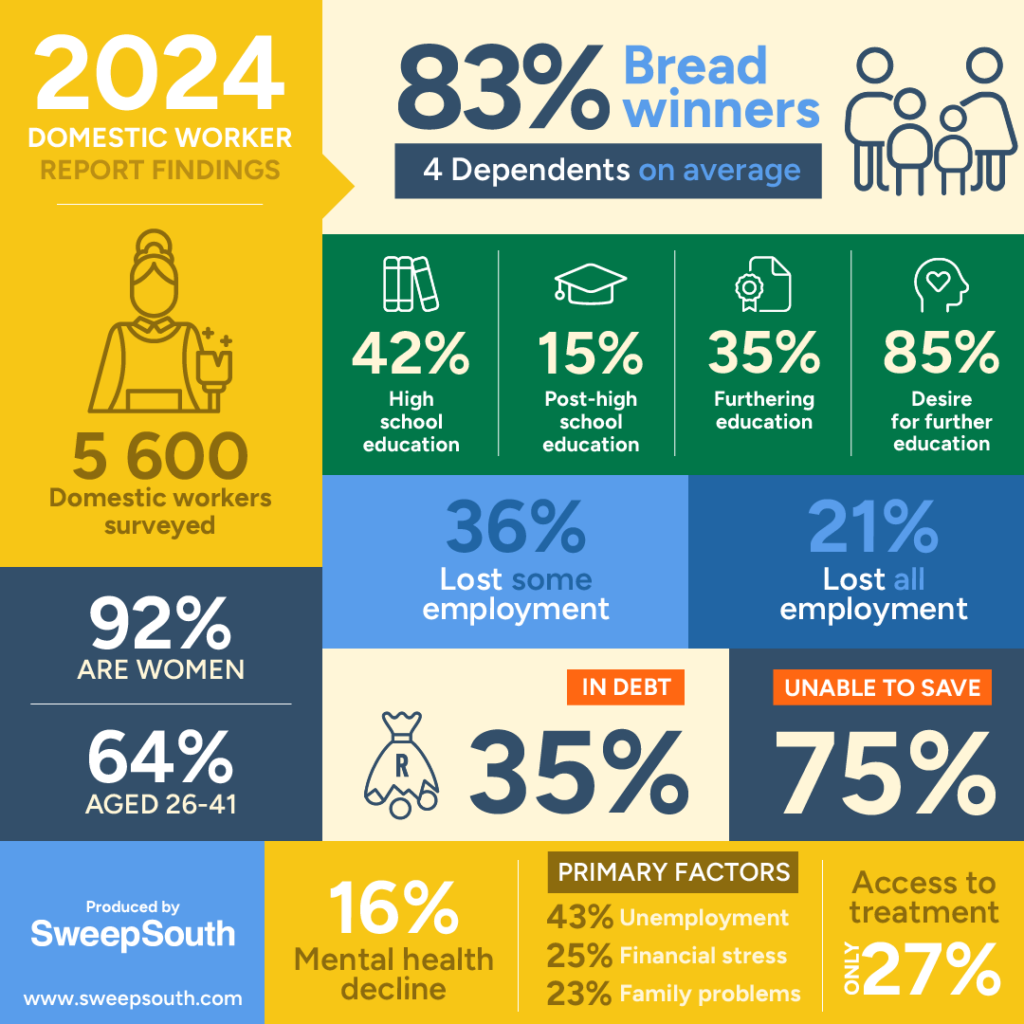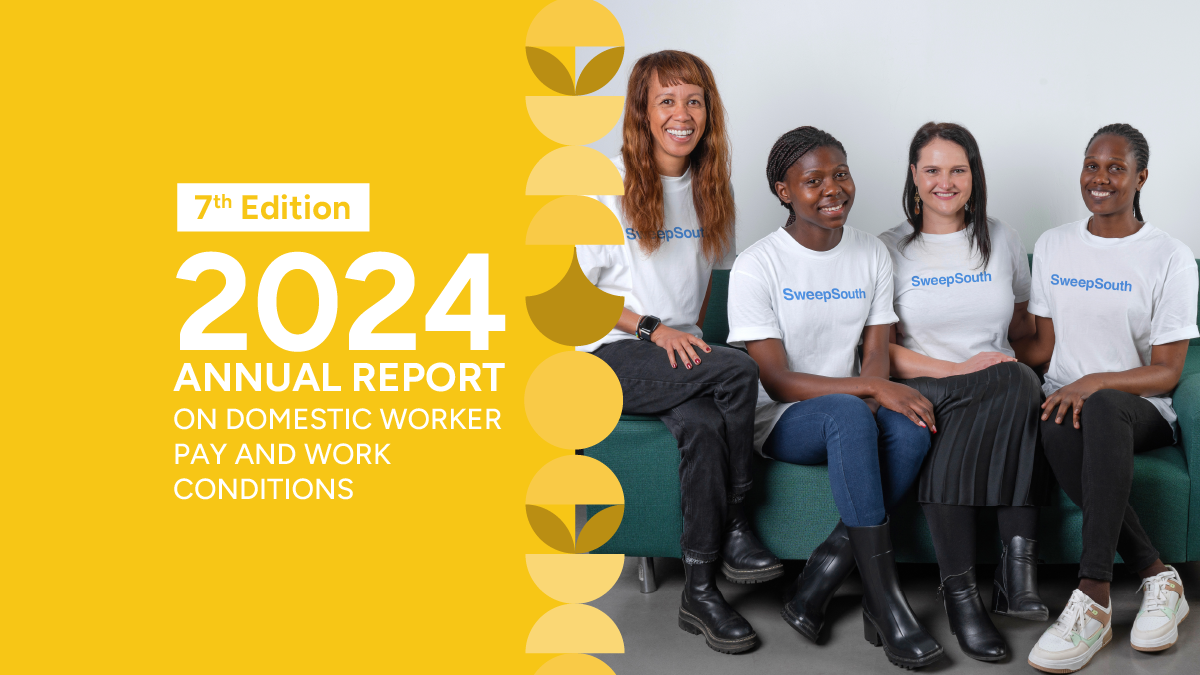The Seventh annual SweepSouth Report on Pay and Work Conditions for Domestic Workers in South Africa gives us a wealth of valuable insight into the current living and working conditions of the people who keep our home and office spaces in pristine condition.
With collective data from all across South Africa, the accumulated statistics from every corner of our country is shared to bring the lives of domestic workers and their current working conditions into the spotlight. Taken from over 5,600 responses, the report provides a far-reaching perception for all who are not involved in the field of domestic work to gain a better understanding of it.
The SweepSouth report reveals:
- 83% of domestic workers are the sole providers of financial support to their families
- Earnings increased 5% year-on-year, but living costs increased 15%
- Mental health is a major worry, with 16% of domestic workers reporting a decline in the past year
- Employment in the sector has not fully recovered from pre-COVID-19 levels, with 15% fewer jobs available

Inflation and the broader cost-of-living crisis are taking an immense financial and mental toll on South Africa’s domestic workers. That’s one of the standout findings from the seventh annual SweepSouth Report on Pay and Working Conditions for Domestic Workers, released this week.
The report, which has tracked progress in the pay and working conditions of domestic workers since 2018, also reveals that living costs for the average domestic worker have increased by 15% in the past year, dwarfing the five percent earnings increase they accrued over the same period. Additionally, it shows that issues that arose at the height of the COVID-19 pandemic, including lower job availability, remain stubbornly persistent.
The 2024 SweepSouth Report draws on survey responses from more than 5,600 workers and reveals that the domestic workforce remains predominantly female (92%), with most workers between the ages of 26 and 41 (64%). It also underlines the critical role that domestic workers play within their communities, with 83% as the sole financial support within their household. The average number of dependents remains high at four, underscoring their immense financial responsibility.
Adding to that financial burden are rising costs across almost every category. While the effects of inflation are well documented, housing costs, in particular, have risen disproportionately, warranting further investigation. The lingering effects of the COVID-19 pandemic are also evident in the domestic work sector, which has stabilised at around 850,000 jobs, marking a 15% reduction from its pre-pandemic peak.
Small wonder then that job losses remain a major threat for many local domestic workers. Here, the cost-of-living crisis has exacerbated things too, with 36% of employed respondents reporting losing some work due to employer affordability, while 21% of respondents lost full employment in the last year due to affordability (25%) and employer relocation (34%). Financial insecurity is also widespread, with 75% of respondents unable to save money monthly. While there’s a positive trend towards savings and pension participation, 35% of domestic workers are in debt, with a third feeling trapped in a hopeless repayment cycle.
This deep-seated financial stress has a significant impact on the mental health of domestic workers too. Some 16% of respondents reported a decline in the past year, primarily due to unemployment, financial stress, and family problems. Access to professional mental health treatment remains limited, leaving many to cope without adequate support.
“The figures outlined in the report make for sobering reading,” says Lourandi Kriel, CEO of SweepSouth. “They also underline how critical economic reform will be if South Africa is to be a mentally healthy country where all inhabitants live in comfortable dignity.”
There are, however, a few rays of light, including in the desire for ongoing education and skills development.
While 42% of domestic workers have completed high school, and an additional 15% have pursued higher education, a thirst for learning remains strong. A significant 85% expressed a desire to continue their education if resources allowed. For those who transitioned to different jobs, encouragingly, 39% reported better pay and 70% experienced improved or similar treatment.
When it comes to addressing these challenges, SweepSouth suggests several courses of action, including, enforcing labour laws more rigorously and exploring innovative solutions for compliance in private homes, considering diverse work arrangements and vulnerable groups.
SweepSouth also believes that it’s important to Improve access to ongoing education and training for domestic workers.
“Government, employers, and the private sector must collaborate to provide affordable education, flexible scheduling, financial assistance, and technology access,” says Kriel.
From a mental health perspective, it advises Investing in mental support, including accessible services, training for community leaders, and safe spaces for women. It additionally recommends increased support for workers facing abuse through education, reporting mechanisms, and material assistance for survivors.
Finally, it recommends fostering collaboration among government, private sector, and civil society to drive data-driven solutions and advocate for the rights and well-being of domestic workers.
DOWNLOAD OR VIEW THE REPORT BELOW:
DOWNLOAD OR VIEW THE REPORT ADDENDUM BELOW:
Key findings at a glance:
- 36% of employed respondents experienced job losses due to employer affordability issues
- 21% of respondents lost all employment in the last year
- 75% of respondents were unable to save money monthly
- 35% of domestic workers are in debt, with a third feeling trapped in a hopeless repayment cycle
- 85% of respondents want to further their education if they had the money and/or time
- Unemployment and deep-seated financial stress are having a significant impact on the mental health of domestic workers
“The 2024 SweepSouth Report underscores the complexities and challenges within South Africa’s domestic work sector,” says SweepSouth Group COO, Luke Kannemeyer. “While positive trends in earnings and savings offer glimmers of hope, the persistent issues of low wages, job insecurity, safety concerns, and mental health struggles highlight the urgent need for collaborative action.”
“The data in the report only captures part of the consequences of job losses, which can push domestic workers and their families into precarious circumstances. Navigating the challenges ahead will require strong leadership and decisive action.”
ALSO SEE: SIXTH ANNUAL DOMESTIC WORKERS REPORT 2023








